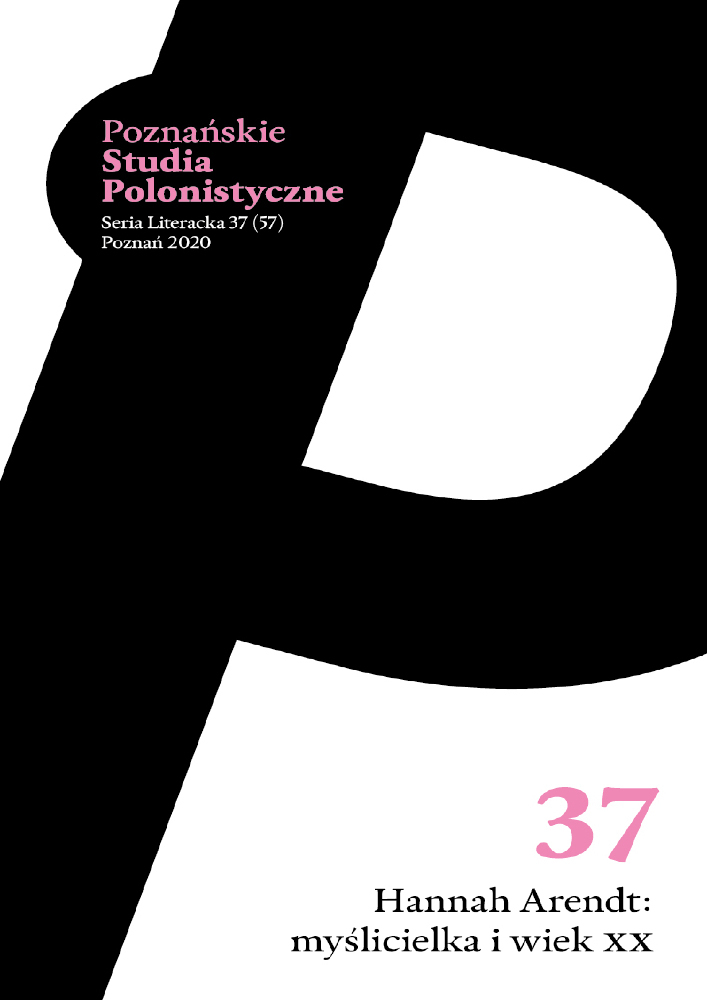Abstract
The article shows Baudelaire’s poetry as a sign of both fascination and disgust with melancholy at the same time, which paradoxically results in an over-representation of melancholic images. Black yarn is the key image in the interpretation of Fleurs du mal presented here. Blackness appears as a sign of emptiness, of what is lost, as something interiorized and appropriated by a melancholic subject. The article proves that this emptiness and abysmal desolation in Baudelaire’s texts provide the substantive weight and that blackness becomes the materialization of melancholy and the matter of poetry at the same time, which leads us directly to a melancholic poetry par excellence.
References
Antoine Gérald (1967), La Nuit chez Baudelaire, „Revue d’Histoire Littéraire de la France”, nr 2, s. 375-401.
Baudelaire Charles (1887), OEuvres posthumes et correspondances inédites, Maison Quantin, Paris.
Baudelaire Charles (1994), Kwiaty zła / Les Fleurs du mal (1868), wybór Maria Leśniewska, Jerzy Brzozowski, przekład zbiorowy, Wydawnictwo Literackie, Kraków. Baudelaire Charles (2003a), „Pani Bovary” Gustawa Flauberta, przeł. Andrzej Kijowski, w: tegoż, Sztuka romantyczna, wstęp Andrzej Kijowski, przekład zbiorowy, słowo/obraz terytoria, Gdańsk, s. 95-105.
Baudelaire Charles (2003b), Piotr Dupont, przeł. Andrzej Kijowski, w: tegoż, Sztuka romantyczna, wstęp Andrzej Kijowski, przekład zbiorowy, słowo/obraz terytoria, Gdańsk, s. 57-66.
Bieńczyk Marek (1998), Melancholia. O tych, co nigdy nie odnajdą straty, Sic!, Warszawa.
Bieńczyk Marek (2002), Oczy Dürera. O melancholii romantycznej, Sic!, Warszawa.
Brzozowski Jerzy (2014), Charles Baudelaire: między melancholią a żarliwością, w: Przeciw melancholii w 40. rocznicę wydania „Melancholii” Antoniego Kępińskiego – perspektywy FIDES i RATIO, red. Agnieszka Hennel-Brzozowska i Stanisław Jaromi OFMConv, Polska Akademia Umiejętności, Kraków, s. 121-128.
Caramatie Bernard (2015), L’ordre de Baudelaire. Lecture des Fleurs du Mal, Hermann Éditeurs, Paris.
Dufour Pierre (1988), „Les Fleurs du Mal”: dictionnaire de mélancolie, „Littérature”, nr 4: Matière de poésie, s. 30-54.
Hirt André (1998), Baudelaire. Exposition de la poésie, Editions Kimé, Paris.
Kępiński Antoni (1974), Melancholia, Państwowy Zakład Wyd. Lekarskich, Warszawa.
Klibansky Raymond, Panofsky Erwin, Saxl Fritz (2009), Saturn i melancholia. Studia z historii, filozofii, przyrody, medycyny, religii oraz sztuki, przeł. Anna Kryczyńska, Universitas, Kraków.
Kristeva Julia (2007), Czarne słońce. Depresja i melancholia, przeł. Michał Paweł Markowski, Remigiusz Ryziński, Universitas, Kraków.
Labarthe Patrick (1997), Spleen et création poétique dans „Les Fleurs du Mal”, w: Poètes du spleen. Leaopardi, Baudelaire, Pessoa, red. Philippe Daros, Champion, Paris, s. 115-166.
Leconte Frantz (1989) La tradition de l’ennui splénétique en France de Christine de Pisan à Baudelaire, City University of New York, New York.
Maillaird Pascal (2000), L’Allégorie Baudelaire. Poétique d’une métafigure du discours, „Romantisme”, nr 107, s. 37-48.
Maulpoix Jean-Michel (1998), Le spleen baudelairien, une mélancolie moderne, w: Poétiques du néant: Leopardi, Baudelaire, Pessoa, red. Béatrice Didier, Déborah Lévy-Bertherat, Gwenhaël Ponnau, Paris, s. 23-38.
Nerval Gérard de (2012), Aurelia, przeł. Ryszard Engelking, w: tegoż, Śnienie i życie, przeł. Ryszard Engelking i Tomasz Swoboda, słowo/obraz terytoria, Gdańsk, s. 73-127.
Richter Mario (2001), Baudelaire. „Les Fleurs du Mal”. Lecture intégrale, t. 1, Slatkine, Genève, s. 281-284.
Sartre Jean Paul (2007), Baudelaire, przeł. Krzysztof Jarosz, Zielona Sowa, Kraków.
Siwiec Magdalena (2014), Ze stygmatem romantyzmu. O Norwidzie i Baudelairze z perspektywy nowoczesności, „Teksty Drugie”, nr 4, s. 196-214.
Stala Marian (1980), Od czarnego słońca do ciemnego świecidła, „Teksty”, nr 6, s. 105-121.
Starobinski Jean (2017), Atrament melancholii, przeł. Krystyna Belaid, słowo/obraz terytoria, Gdańsk.
Śniedziewski Piotr (2010), „Spleen” – dialog anatomii z psychologią. Problemy recepcji i przekładu, „Rocznik Komparatystyczny”, t. 1, s. 105-124.
Śniedziewski Piotr (2011), Spoglądać w zmącone zwierciadło (Baudelaire), w: tegoż, Melancholijne spojrzenie, Universitas, Kraków, s. 203-230.
Wilhem Fabrice (1999), Baudelaire : L’écriture du narcissisme, Harmattan, Paris.
License
Authors
Authors of texts accepted for publication in „Poznańskie Studia Polonistyczne. Seria Literacka” are required to complete, sign and return to the editor's office the Agreement for granting a royalty-free license to works with a commitment to grant a CC sub-license.
Under the agreement, the authors of texts published in „Poznańskie Studia Polonistyczne. Seria Literacka” grant the Adam Mickiewicz University in Poznań a non-exclusive, royalty-free license and authorize the use of Attribution-NoDerivatives 4.0 International (CC BY-ND 4.0)Creative Commons sub-license.
The authors retain the right to continue the free disposal of the work.
Users
Interested Internet users are entitled to use works published in „Poznańskie Studia Polonistyczne. Seria Literacka” since 2016, for non-commercial purposes only, under the following conditions:
- attribution - obligation to provide, together with the distributed work, information about the authorship, title, source (link to the original work, DOI) and the license itself.
- no derivatives - the work must be preserved in its original form, without the author's consent it is not possible to distribute the modified work, such as translations, publications, etc.
Copyrights are reserved for all texts published before 2016.
Miscellaneous
Adam Mickiewicz University in Poznań retains the right to magazines as a whole (layout, graphic form, title, cover design, logo etc.).
